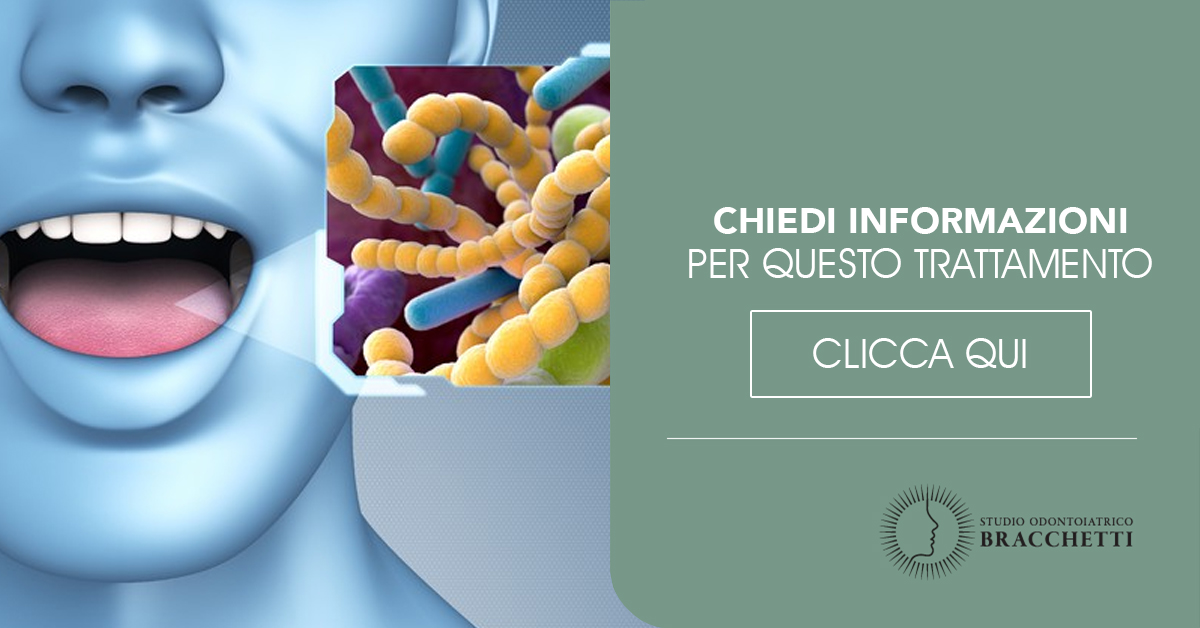Treatment of periodontitis
Periodontology is that branch of dentistry that deals with the supporting tissues of the tooth, namely the gum, the bone, and the periodontal ligament.
Treatment and prevention of periodontitis
Periodontitis is the inflammation of the periodontium, that is the set of gums, bone, ligaments and root cement (structure that defends the root of the tooth and the soft structures inside it) that keep the tooth anchored to the jaw. Periodontitis arises as a result of gingivitis, that is, the worsening inflammation of the gum caused by the presence of bacterial plaque, a sticky substance that acts as a "glue" for the bacteria on the teeth. It is important to immediately contact specialists in the field to be able to diagnose and treat periodontitis as soon as possible. Although the progression is generally slow, this infection can seriously compromise the teeth up to the point of falling out. Below we will see what the first warning signs are and how to treat and prevent periodontitis.
How do I know if I have periodontitis?
Periodontitis, like gingivitis, has different symptoms based on the severity and intensity of the inflammation. They can depend on various factors such as the health conditions in which the subject is at the time of the disease, the type of bacterial plaque present, and external factors such as smoking and stress. Generally the first symptoms that appear in the patient suffering from periodontitis are:
- Alitosis
- Redness and pain of the gums
- Bleeding of the gums
- Lowering of the gums
The symptoms listed above are not only a sign of periodontitis, but can also indicate that a bacterial infection such as gingivitis is in progress, so in any case it is important to make an appointment immediately with your trusted dentist for a diagnosis and prevent the situation from worsening further.
In the event that periodontitis worsens, the bacteria will pass from the tissues surrounding the tooth to the bone, at this stage we will notice the appearance of a:
- Periodontal pocket
a space formed between tooth, gum and bone in which bacterial plaque and tartar lurks.
In the most severe phase of inflammation, the bacteria will have destroyed the support of the tooth which will initially be mobile, and then fall out if you do not intervene in time to stop the process.
- Mobility of the tooth/ teeth
- Loss of tooth/ teeth
In diseases such as periodontitis the timing is very important. We must never neglect the well-being of our teeth and our mouth especially in the presence of obvious symptoms that make it clear that our dental health at risk. / p>
Treating periodontitis
As mentioned in the previous paragraph, it is essential that the infection is diagnosed as soon as possible so that its progress does not permanently damage the tooth/ teeth. Therefore, depending on the stage of periodontitis, the specialist will intervene with different solutions. In general, the procedures that the patient will undergo consist of:
- Deep cleansing with removal of plaque and tartar in the subgingival area
- Removal of damaged parts of the tooth by polishing and cleaning it thus favoring the reattachment of the gum and inhibiting plaque deposits
- Constant monitoring and cleaning of the teeth by your trusted specialist
- Periodic home care prescribed by the doctor
- Very scrupulous daily oral hygiene
- Tooth removal and replacement only in cases of very advanced periodontitis
These are the recommended and most frequently applied treatments. But we must not forget that the treatment process and the therapy will be chosen by the specialist only after a careful analysis and an in-depth study of the patient's clinical status.
Preventing periodontitis
At the Bracchetti Dental Practice in Milan we always say to our patients: the best cure is prevention! Therefore it is essential to keep in mind the right daily habits that allow us to "keep away" germs and bacteria, thus keeping our teeth and mouth in good health.
In addition to genetic predisposition and clinical history, it has been scientifically proven that bad habits expose subjects more to the risk of developing diseases such as periodontitis. Therefore we recommend:
- Always maintain proper oral hygiene
- Avoid the accumulation and retention of plaque by resorting to teeth cleaning every six months
- Quit/ avoid smoking
- Periodic check-ups at the dentist
Maintaining these healthy habits does not completely exclude the onset of diseases such as periodontitis, but it minimizes the risk.
Remember that taking care of your teeth and mouth affects not only the aesthetic aspect, but also the well-being of the whole body.
Periodontal disease (formerly called “pyorrhea”) destroys these tissues and causes tooth loss. It is defined periodontal because the gums are part of a more complex structure, the periodontium, which is also made up of bone, connective fibers (the periodontal ligament), and the cementum of the roots of the teeth.
In our clinic, periodontal surgery is performed (which consists of a surgical dressing of the deep gingival pockets, which may or may not involve bone structures), surgery for root coverage of gingival recessions, crown lengthening surgery (which has the effect of improving the proportion between gingiva and teeth), muco-gingival surgery (which deals with reconstructing lost gum tissue), frenectomy (surgical procedure performed to remove a section of the frenulum, fibrous tissue that connects the lips and tongue to the maxillary arch), bone surgery (deals with the treatment of bone defects), bone regeneration and alveolar ridge augmentation/ preservation (in the first case it is a surgical technique that serves to increase bone volume in cases of deficiency, while the second goes to work in the seat where the tooth is immersed), bone graft, and surgery for positioning miniscrews for orthodontics.
Gum disease is increasingly common among adults in Italy. Many of us don't recognize the early symptoms. This can be problematic not only for our gum health but also because of the increased risk of tooth loss and overall health impairment. It is important to know what to look for when it comes to gum disease and how gums can be treated to restore oral health.
Dr. Guido Bracchetti answers the most frequently asked questions on gum pathologies:
Can you have advanced gum disease without being aware of it?
Yes, it is possible to have early stage gum disease without being aware of it. You may have just a little discomfort like red gums or some slight bleeding, which many people believe is normally due to the use of dental floss or brushing that is too intense. This phenomenon is actually the first sign of inflammation.
It is only when the disease intensifies that symptoms become more evident.
Often patients realize they have gum disease when they have more bleeding, abscesses, teeth that feel more mobile, and even loss of supportive bone and gum recession.
Are the effects of gum disease reversible?
It is possible to reverse gum disease, depending on where you start to intervene. To reverse the effects of gum disease, the sooner you notice symptoms the better. It is possible to start controlling the inflammation of the gums and periodontal tissues with good daily hygiene. The sooner you go to a dentist, the sooner you can begin to reverse the process of gum disease or at least stop its progress.
How is gum disease treated?
A visit to your dentist is required as soon as possible. Book an appointment now. Improving your home hygiene routine without proper advice from a dentist or hygienist may not lead to visible results. As soon as you realize that there is a problem, you need to ask for advice from a good professional, preferably a periodontist: the gum specialist. In these cases you need a doctor with the necessary training and skills who can advise you correctly.
The best way is prevention: as soon as you notice the first symptoms it is necessary to intervene with a conservative approach. This means hygiene appointments with the compilation of periodontal records and appointments, preferably 2-4 times a year . You can see a huge improvement with this approach.
If you are already in an advanced stage of gum disease, in addition to all the above, there may be a need for a surgical approach. This would involve treating the tissues (gums and bone) around the tooth and in the worst case an extraction. Surgical treatment is aimed at improving the health of the teeth and avoiding extractions.
What happens in your mouth when you lose a tooth?
When a tooth is lost due to advanced gum disease, there are a number of critical anatomical changes in the jaw. When the tooth is lost, the height and thickness of the jaw bone begin to decrease slowly. This can cause problems not only for the placement of potential future implants, but also for the remaining teeth that move to fill the space that has been created. All this causes occlusal changes affecting chewing and occlusion.
What are the long-term health implications of missing one or more teeth?
There can be a wide range of implications. If teeth are lost, depending on where they are positioned in the mouth, this can affect the bite and the alignment of the teeth. If missing teeth are causing occlusion problems, bad chewing can also affect nutrition and diet.
Why you need healthy gums before you can undergo dental implantology
Gum health is essential for both natural teeth and dental implants. If you are prone to periodontal disease, there will be a greater chance of developing a disease around the dental implant known as peri-implantitis and peri-mucositis.
Before placing implants, it is very important to have complete control of the health of the gums and to address and resolve any periodontal condition. Some people mistakenly believe that because implants are made of metal, they can be placed in the mouth without worrying about diseases and inflammation. This is a misconception as you are subject to the same problems that occur with natural teeth.
When it comes to gum disease, prevention is always the best solution
We need to identify and recognize the symptoms of gum disease.
If there is gum bleeding do not assume that it is only due to too intense brushing or flossing. This can be a sign of gum disease and should be checked. Likewise, any inflammation or mobility in the teeth should be checked by a dentist. It is mistakenly believed that these problems will pass if ignored; unfortunately, this is not the case.
Treatment should be done immediately to prevent the disease from progressing and leading to tooth loss and surgery.
What are your tips for someone who has already experienced tooth loss?
If the person has already lost one or more teeth, there are a number of solutions to replace the missing teeth. Book an appointment with a specialist dentist at the Bracchetti Dental Clinic to find out more.
If you would like to make an appointment at the Bracchetti Dental Clinic in Milan click Request form - Or < strong> you can write us on whatsapp and if you want to talk to the secretary you can do so easily by calling the office by clicking here
















